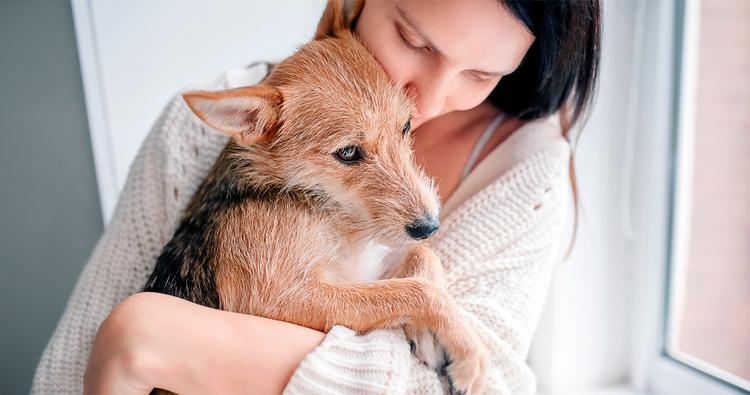What Is a Rehoming Fee?
Thinking about adopting a pet that comes with a rehoming fee? No red flags here — they're like adoption fees (only less!) and are perfectly legit.
Thinking about adopting a pet that comes with a rehoming fee? No red flags here — they're like adoption fees (only less!) and are perfectly legit.
by Jackie Brown, | January 8, 2024

Olga Moreira / Stocksy
A rehoming fee is a payment you make to a person or organization from which you are adopting a pet. This fee typically helps offset prior expenses associated with the pet, and discourages people who may harm animals from adopting them.

Need to find your pet a new home?
“Rehoming” refers to transferring ownership of a pet from one home to another. This may be due to financial difficulties, domestic issues (such as conflicts with kids or other pets), or changes in household circumstances, including moving to a home that does not allow pets. The goal of rehoming a dog, cat, or other pet is to permanently place them in a stable environment with responsible pet parents. Unlike surrendering a pet to an animal shelter or abandoning them, rehoming gives pet parents the opportunity to choose a safe home for their pet and keeps the animal out of shelters and rescues.
A rehoming fee, which comes from an individual looking to rehome their pet, is very common. It is technically different from an adoption fee, which originates from a shelter or organization and typically costs more. There are a few purposes for a rehoming fee.
The first is that they help cover the expenses necessary to care for pets up until adoption. This may include parasite preventives, spaying and neutering, vaccinations, and other medical care. By paying the fee, a potential pet parent also indicates that they can afford to adopt the animal, which can be a serious financial commitment. (Potential adopters should consider everything the pet needs to live a healthy, happy life, like nutritious food and veterinary care.) Lastly, these fees also serve the purpose of discouraging people from acquiring the animal for inhumane purposes such as dog-fighting, bait for other animals, or for use in labs.
Paying a rehoming fee to adopt a pet might sound a bit like buying a pet, but a true adoption fee is different. How to spot the difference? You can expect rehoming fees to be relatively low compared to buying a pet.
There are some protections in place for potential adopters. Sites with classified ads, like Craigslist and Nextdoor, have terms of use that allow pet adoption and rehoming, but prohibit the sale of animals. Nevertheless, watch-out for backyard breeders and nefarious people who may try to circumnavigate those guardrails by listing a pet as “free to a good home,” but charge an exorbitant fee akin to the price of buying a purebred puppy. (This is illegal on those platforms.) Other red flags to look out for include one person listing several different animals, especially purebred or designer dogs and cats, across multiple sites, and charging excessive rehoming fees for them, too.
Laws are generally created to encourage the adoption of animals. To that end, a number of cities, counties, and states actually prohibit the sale of dogs or cats, even in pet stores. But that does not affect animal shelters, private rescue groups, or individuals rehoming pets from charging rehoming fees. That said, some laws do place a cap on rehoming fees to prevent people from working around these bans by charging excessive “rehoming fees” when they are, in fact, selling pets.
Rehoming fees vary based on who is adopting out the animal (a shelter, a private rescue, or an individual), which type of medical care the pet has received (including spaying and neutering), how old the pet is, and where you live. Puppies and kittens tend to be in more demand, and often have higher rehoming fees, especially if they’ve been spayed, neutered, vaccinated, or received other medical care. In contrast, rehoming feeds for senior pets tend to be lower to encourage people to adopt them.
The average rehoming fee for a dog runs from $50 to $250. The fee may be more for puppies, and for dogs that have received special medical care. You may encounter lower — or even waved — rehoming fees for senior dogs and other canines that have languished in rescue for a while. In general, rehoming fees for dogs should never run more than $300.
A rehoming fee for a cat averages a bit lower than for dogs, ranging from about $50 to $100. Kittens and special-needs cats sometimes command higher fees, while seniors and long-time shelter cats require lower rehoming fees. Some organizations even offer fee-free adoptions for cats that have been living at a shelter for a long time.
You can expect to spend between $420 and $3,270 during your first year of dog ownership. To figure out the cost of dog ownership, it’s helpful to break down your budget into one-time costs (at the time of adoption) and then recurring monthly and yearly costs. Initial costs include the adoption fee, spaying or neutering, puppy vaccines, microchipping, training, and initial supplies (such as crates, beds, collars and leashes, feeding bowls, toys, and grooming tools). Recurring costs include dog food, treats, preventive veterinary care, and pet licensing.
The average cat parent spends between $750 and $2,675 their first year of cat ownership. You can expect the cost of cat ownership to be higher the first year you welcome your new cat, due to one-time costs at the time of adoption. Those initial costs include the adoption fee, spaying or neutering, kitten vaccines, microchipping, and initial supplies (such as litter boxes, feeding bowls, scratchers, cat trees, beds, collars, toys, and grooming tools). After the first year, recurring costs include things like cat litter, cat food, treats, and preventive veterinary care.
No Dog Left Behind: A Hedonic Pricing Model for Animal Shelters Rescue Dog: A Guide to Successful Re-homing


Jackie Brown lives in sunny Orange County, CA, where she works as a freelance writer and editor. When she’s not on deadline, you can find her paddling her outrigger canoe in the Pacific Ocean or hiking in the foothills with her miniature poodle and two young boys.

Rehome

Rehome

Rehome














Behavior & Training


Behavior & Training






